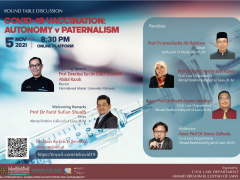الأخبار

SHOULD PERSONAL AUTONOMY END WHERE PUBLIC PERIL BEGINS AS IN THE CASE OF COVID-19 VACCINATION?
التاريخ : 08 November 2021
المحرر : AREEJ BINTI TORLA
الفئة : News
غرد هذا

Gombak, 5 November 2021. COVID-19 continues to adversely impact the health and well-being of the population around the world. The seeming readiness of pharmaceutical companies in cashing upon the misery and dire needs of the people causes conspiracy theories to flourish and casts doubt on the existence of public health emergencies although the rise of the number of deaths related to COVID-19 persists.

Prof Dr Jamalludin Ab Rahman, a professor in public medicine with the background in epidemiology and biostatistics reminds the participants that the COVID-19 threat to life is real. He observes that the number of infections in 37 countries continue to rise exceeding 200 million with reported deaths exceeding 5 million. Thus, it is imperative that public health measures are taken to protect the lives and the health of the people. For now, data shows that vaccination is able to reduce infection and severity of the infection.

Prof Dr Puteri Nemie Jahn Kassim, a professor in medical law observes that the law put personal autonomy, particularly bodily integrity, in high regard. Thus, any medical treatment requires informed consent of patients. Failure to obtain informed consent from patients may resulted in disciplinary and legal actions against the medical practitioners.
However, in public health emergencies, the law may put the need of the community higher than the need of the individual. Thus, the Prevention and Control of Infectious Diseases Act 1988 dispenses with the requirement of consent and provide powers to the public authority to forcefully quarantine and to take necessary measures to control infectious diseases. The Act also creates offences for those who obstruct or fail to follow such instructions.

According to Assoc Prof Dr Khairil Azmin Mokhtar, a professor in constitutional law, the Federal Constitution assures bodily integrity and protection of livelihood under the right to life. However, the Federal Constitution also provides the doctrine of holding office during the pleasure of the Yang di-Pertuan Agong, where a public servant may have little choice but to follow the lawful instruction of the public authority.
For those in the private sector, the employer has the responsibility under relevant laws to provide a safe working environment which may be achieved through vaccination. Consequently, the requirement of employees to receive vaccination may be regarded as reasonable in discharging the duty of the employer.
The Federal Constitution also provides the guarantee against discrimination. However, the constitution does not prohibit reasonable classification where like should be treated alike. Thus, the law may reasonably classify and treat differently the vaccinated and the unvaccinated.

Prof Emeritus Tan Sri Dzulkifli Razak in his opening speech reiterates the objective of the university in contributing opinions and solutions for the protection of life, intellect, wealth, lineage and religion of the people. He reminds the audience of the necessity for ethical conducts by all parties, including the pharmaceutical multinational corporations, in dealing with COVID-19 so that decisions made are based on sound data and deliberation.

Prof Farid Sufian Shuaib echoes the hope that the Roundtable Discussion programme contribute to the national discourse and understanding in dealing with the present public health danger.

The Civil Law Department which is led by Dr Mazlena Mohamad Hussain organises the programme and Assoc Prof Dr Sonny Zulhuda moderates it.









